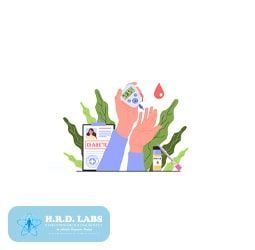
Human Research & Diagnostics (HRD)
Diabetic Package
Diabetic
Human Research & Diagnostics (HRD Laboratories) offers medical documentation packages and a wide range of health checkup packages to cover all age groups and all the sexes. These packages have been very thoughtfully formulated by a team of highly qualified and experienced medical professionals
Blood-urea-nitrogen-bun
To evaluate the health of your kidneys to help diagnose kidney disease to monitor the effectiveness of dialysis and other treatments related to kidney disease or damage
Specimen:A blood sample drawn from a vein in your arm
When To Get Tested: As part of a routine comprehensive or basic metabolic panel when you have signs and symptoms that may be due to kidney disease or you have a condition that may cause or be worsened by kidney dysfunction at regular intervals when you are being treated for kidney disease or damage
Test Preparation:None
Normal Test Result: around 7 mg/dL to 20 mg/dL (2.5 to 7.1 mmol/L)
Total Cholesterol
To screen for risk of developing heart disease to monitor effectiveness of lipid-lowering therapy
Specimen:Most often a blood sample is collected from a vein in the arm Sometimes cholesterol is measured using a drop of blood collected by puncturing the skin on a finger A fingerstick sample is typically used when cholesterol is being measured on a portable testing device for example at a health fair
When To Get Tested: Screening as part of a regular health exam with a lipid profile when no risk factors for heart disease are present adults should be tested once every four to six years children teens and young adults should be tested once between the ages of 9 and 11 and then again between the ages of 17 and 21 Monitoring may be done more frequently and at regular intervals when risk factors for heart disease are present when prior results showed high risk levels and or when undergoing treatment for unhealthy lipid levels
Test Preparation:Cholesterol tests typically require fasting for 9-12 hours before the test only water is permitted Your healthcare practitioner may decide that you may be tested without fasting Follow any instructions you are given and tell the person drawing your blood whether or not you have fasted For youths without risk factors testing may be done without fasting
Normal Test Result: 125 to 200
Creatinine
To evaluate the health of your kidneys to help diagnose kidney disease to monitor treatment for kidney disease
Specimen:A blood sample drawn from a vein in your arm and or a 24-hour urine sample
When To Get Tested: Routinely as part of a comprehensive or basic metabolic panel when your have signs and symptoms that may be due to kidney disease or damage or when you have a condition that may affect your kidneys and or be worsened by kidney dysfunction at intervals to monitor treatment for kidney disease or kidney function while on certain medications
Test Preparation:You may be instructed to fast overnight or refrain from eating cooked meat some studies have shown that eating cooked meat prior to testing can temporarily increase the level of creatinine
Normal Test Result: 0.84 milligrams per deciliter to 1.21 milligrams per deciliter (74.3 to 107 micromoles per liter), although this can vary from lab to lab, between men and women, and by age
Urine-albumin-and-albumincreatinine-ratio
To detect early kidney disease in those with diabetes or other risk factors such as high blood pressure hypertension
Specimen:A random timed overnight or 24-hour urine sample
When To Get Tested: Annually after a diagnosis of type 2 diabetes annually 5 years after diagnosis of type 1 diabetes
Test Preparation:None
Normal Test Result: creatinine (mg/L) of less than 30 is normal
Vldl-cholesterol
To help assess the risk of developing heart disease
Specimen:When other lipid tests such as a lipid profile are being performed
When To Get Tested: When other lipid tests such as a lipid profile are being performed
Test Preparation:Usually fasting for 9-12 hours before the test only water permitted and no alcohol for 24 hours before the test follow any instructions you are given
Normal Test Result: from 2 mg/dL to 30 mg/dL (0.1 mmol/l to 1.7 mmol/l)
HDL Cholesterol
To screen for risk of developing heart disease to monitor effectiveness of lipid-lowering therapy
Specimen:Most often a blood sample is collected from a vein in the arm Sometimes cholesterol is measured using a drop of blood collected by puncturing the skin on a finger A fingerstick sample is typically used when cholesterol is being measured on a portable testing device for example at a health fair
When To Get Tested: Screening as part of a regular health exam with a lipid profile when no risk factors for heart disease are present adults should be tested once every four to six years children teens and young adults should be tested once between the ages of 9 and 11 and then again between the ages of 17 and 21 Monitoring may be done more frequently and at regular intervals when risk factors for heart disease are present when prior results showed high risk levels and or when undergoing treatment for unhealthy lipid levels
Test Preparation:Cholesterol tests typically require fasting for 9-12 hours before the test only water is permitted Your healthcare practitioner may decide that you may be tested without fasting Follow any instructions you are given and tell the person drawing your blood whether or not you have fasted For youths without risk factors testing may be done without fasting
Normal Test Result: > 50
Fasting Blood Sugar
This is the test that measures blood sugar levels. Elevated levels are associated with diabetes and insulin resistance, in which the body cannot properly handle sugar.
-
7 Tests Included
-
- Blood-urea-nitrogen-bun
- Total Cholesterol
- Creatinine
- Urine-albumin-and-albumincreatinine-ratio
- Vldl-cholesterol
- HDL Cholesterol
- Fasting Blood Sugar
Pay Online Pay at Center
₹600.00
₹750.00
20% OFF








